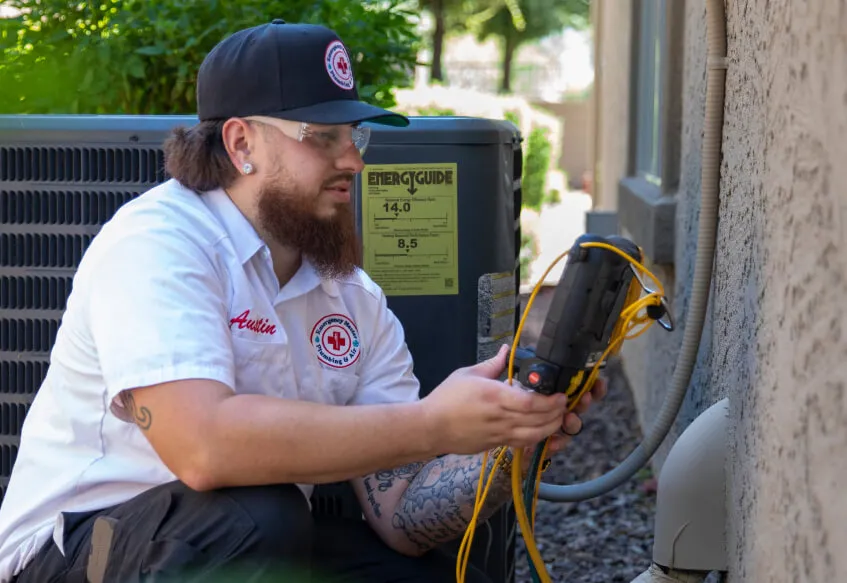RSI is a Great Training Option for Everyone
Learn more about how we can prepare you to advance your career.
Choosing the right HVAC school is the first step to a successful career. But with so many options out there, finding a program that offers the right combination of hands-on training, experienced instructors and career support is key. Whether you’re just starting out or looking to switch careers, knowing what to look for in an HVAC training program can make or break your success.
What Does an HVAC Technician Do?
HVAC (Heating, Ventilation, and Air Conditioning) technicians install, maintain and repair heating, cooling and ventilation systems in residential, commercial and industrial buildings. Here’s a list of key tasks they perform:
Installation of HVAC Systems – Install new heating, cooling and ventilation systems in homes, businesses and factories. Ensure proper placement and secure connections for ducts, wiring and piping.
System Maintenance and Inspection – Perform routine inspections to identify potential issues before they become major problems. Clean and replace air filters, lubricate moving parts and check for leaks or electrical failures.
Troubleshooting and Repairs – Diagnose system malfunctions and repair or replace defective components such as compressors, motors, thermostats and fans. Use specialized tools and diagnostic equipment to detect refrigerant leaks and electrical issues.
Get Started on the Path to a New Career
Fill out our form to learn how we can help you change your life.
Refrigerant Handling – Safely handle and dispose of refrigerants according to EPA regulations. Recharge air conditioning units with proper refrigerant levels.
Ductwork and Airflow Optimization – Install and repair ductwork to ensure proper airflow throughout a building. Seal and insulate ducts to improve efficiency and air quality.
Thermostat and Control System Installation – Install and program thermostats, smart controls and zoning systems for temperature regulation. Educate customers on how to use programmable thermostats for energy savings.
Energy Efficiency Upgrades – Recommend and install energy-efficient systems to reduce utility bills. Conduct home or business energy audits to assess HVAC performance.
Compliance with Safety Codes and Regulations – Ensure all work adheres to local building codes and manufacturer specifications. Follow OSHA1 and EPA2 safety guidelines when handling hazardous materials.
Customer Service and Consultation – Explain system operations, maintenance tips and potential upgrades to customers. Provide cost estimates for repairs, maintenance and new installations.
Emergency Repairs and On-Call Services – Respond to HVAC breakdowns, especially during extreme weather conditions. This means working flexible hours, including nights and weekends to restore heat and cool.
How Do You Become an HVAC Technician?
Becoming an HVAC technician could be the perfect fit for you if you’re looking for a hands-on, in demand career.1 But how do you become an HVAC technician?
The first step is getting the right training and The Refrigeration School (RSI) in Phoenix, AZ has an excellent program to get you started. You can complete the HVAC/R training program at RSI in as little as six months. The program gives you hands-on experience working on actual HVAC equipment so you can gain the skills needed for entry level positions.
RSI’s curriculum covers system diagnostics, electrical components, refrigeration cycles and EPA certification preparation. We also offer career services to help graduates connect with potential employers.
Once you complete your training you can start working as an entry level HVAC technician and gain experience in residential, commercial or industrial settings. Many HVAC techs continue their education or earn additional certifications to advance their careers.
What Makes a Good HVAC School?
If you’re considering a career as an HVAC technician, choosing the right school is one of your most important decisions. A good HVAC training program provides the skills, knowledge and hands on experience to succeed. Here’s what to look for when selecting an HVAC technician school.
Comprehensive Hands On Training
HVAC is a hands-on profession so a great school should offer plenty of real world training. Look for programs that give you access to industry standard equipment so you can practice installations, repairs and troubleshooting in a controlled environment.
Experienced Instructors
A strong HVAC technician school will have knowledgeable instructors with real industry experience. Learning from professionals who have worked in the field means you get practical insights and advice beyond textbooks.
Accreditation and Certifications
Choose a school that’s accredited by a recognized organization. Accreditation means the program meets high educational standards. RSI is accredited by the Accrediting Commission of Career Schools and Colleges (ACCSC)3. Additionally, the school should prepare students for industry certifications such as the EPA Section 608 certification4 required for handling refrigerants.
Job Placement Assistance
The goal of an HVAC technician school is to prepare you for employment. The best programs offer job placement support, career counseling and connections to local employers to help graduates start their careers.
Flexible and Fast Track Programs
Many students want to get to work quickly. A good HVAC technician school offers flexible schedules, day and evening classes and fast track programs to graduate in as little as 6 months.
Why RSI
We check all those boxes. With experienced instructors, hands on training and job placement assistance RSI gives you the skills and support to start your HVAC career.
Learn More
- Because HVAC is a hands-on job, technical training is required for anyone to get into this field. You need to invest in a trade program to learn the trade skills you need to be safe and effective as an HVAC/R technician.
- Contact us at The Refrigeration School 1-888-671-5803 to learn more about our HVAC program.
Compliance Index
- Employment is expected to grow for Heating, Air Conditioning, and Refrigeration Mechanics and Installers (499021) in the U.S. from 415,800 to 438,000 jobs through 2032, and Arizona from 10,450 to 13,650 jobs through 2030. https://www.careeronestop.org – sponsored by the Department of Labor, www.bls.gov, reported as of May 2023. Data pulled April 2024. Visit https://www.rsi.edu/oes for specific details and data backups.




